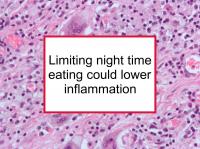Inflammation has been linked to increased risk of breast cancer and its recurrence. Breast cancer growth, invasion and metastasis are all promoted by systemic inflammation, a persistent state that involves the chronic activation of the immune system. Numerous studies have demonstrated that inflammation can be reduced through diet.
In addition, increasing the level of physical activity, losing weight if appropriate, avoiding smoking, and treating type 2 diabetes (preferably with metformin), if it is present, can reduce inflammation.
Now a new study has reported that the timing of meals can also influence inflammation. Frequent small meals and completely eliminating night time eating was found to reduce circulating C-reactive protein (CRP), a marker of inflammation.
C-reactive protein (CRP) and breast cancer
Inflammation results in an increase in CRP, which is produced by the liver and can be measured with a simple blood test. Breast cancer patients tend to have high levels of CRP and other markers of inflammation at diagnosis compared to the general population. Inflammation has been shown to promote the growth of cancer stem cells.
High levels of CRP (both before and after diagnosis) are associated with reduced survival in breast cancer patients, especially in those with HER2 overexpressing (HER2+) disease.
One 2011 study reported that women in the highest third of CRP levels were approximately twice as likely to die from any cause as those in the lowest third. Five-year survival was 90% among low CRP women compared to 74% for high CRP women, relapse-free survival was 87% compared to 74%, and breast cancer-specific death was 11% compared to 20%. Among women with HER2+ tumors, those with the highest compared to the lowest third of CRP levels were 8.6 times more likely to die from any cause during the study period.
Latest research finds CRP is influenced by timing of meals
The study referenced at the beginning of this news article was designed to investigate the associations between eating frequency and timing and metabolic and inflammatory markers reported to be associated with risk of breast cancer. Recent evidence suggests that the frequency and circadian timing of eating influences metabolic health.
The study included women in the National Health and Nutrition Examination 2009-2010 Survey. The authors assessed eating frequency and timing using 24-hour food records. The analysis included (1) the proportion of calorie intake that occurred during the evening (5 pm to midnight); (2) number of meals or snacks ("eating episodes") per day; and (3) the length of the night time fast. Associations were calculated for each of these variables, CRP, and a marker of insulin resistance (the Homeostatic Model Assessment of Insulin Resistance: HOMA-IR).
Each additional 10% in the proportion of calories consumed during the evening was found to be associated with a 3% increase in CRP. On the other hand, consuming one additional meal or snack per day was associated with an 8% reduction in CRP. Not surprisingly, the proportion of calories consumed in the evening and fasting duration were interrelated. Longer night time fasting was found to be associated with an 8% lower CRP only among those women who consumed less than 30% of their daily calories during the evening. The eating frequency and timing variables were not found to be significantly associated with insulin resistance.
The authors conclude that the study results suggest that eating more frequently, reducing evening calorie intake, and fasting for longer nightly intervals could lower systemic inflammation, thereby reducing breast cancer risk. Randomized trials are needed to validate these associations, according to the authors.
Please see our article on inflammation for more information.
